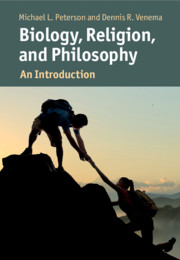Book contents
- Biology, Religion, and Philosophy
- Cambridge Introductions to Philosophy and Biology
- Biology, Religion, and Philosophy
- Copyright page
- Dedication
- Contents
- Acknowledgments
- Introduction
- Part I General Issues
- 1 Science, Biology, and Religion
- 2 The Origin and Nature of Life
- 3 The Question of Design in Living Systems
- 4 Biology and the Problem of Natural Evil
- 5 Progress, Purpose, and Providence
- Part II Religion and Human Biology
- Glossary
- Further Reading
- Index
3 - The Question of Design in Living Systems
from Part I - General Issues
Published online by Cambridge University Press: 25 March 2021
- Biology, Religion, and Philosophy
- Cambridge Introductions to Philosophy and Biology
- Biology, Religion, and Philosophy
- Copyright page
- Dedication
- Contents
- Acknowledgments
- Introduction
- Part I General Issues
- 1 Science, Biology, and Religion
- 2 The Origin and Nature of Life
- 3 The Question of Design in Living Systems
- 4 Biology and the Problem of Natural Evil
- 5 Progress, Purpose, and Providence
- Part II Religion and Human Biology
- Glossary
- Further Reading
- Index
Summary
Perhaps no issue at the intersection of biology and religion has received more attention now or in the past than the issue of design. The general problem is whether to explain the manifest appearance of design in nature as apparent or real. In living systems, should function be attributed to an intelligent cause or to natural causation? The debate over this question is as ancient as it is contemporary. Of particular historical and intellectual importance is the tension between the design argument advanced by many thinkers, famously presented by William Paley in the early nineteenth century, and the natural biological explanation, offered by Charles Darwin in the mid-nineteenth century. As our discussion develops, we evaluate the Intelligent Design (ID) argument of the past few decades as well as various forms of theistic evolution as ways of combining ideas of intelligence or purpose with the facts of biology. Likewise, we discuss and evaluate both scientific and philosophical perspectives that reject the idea that intelligence or purpose can be applied to biology or any of the other sciences.
- Type
- Chapter
- Information
- Biology, Religion, and PhilosophyAn Introduction, pp. 57 - 80Publisher: Cambridge University PressPrint publication year: 2021

